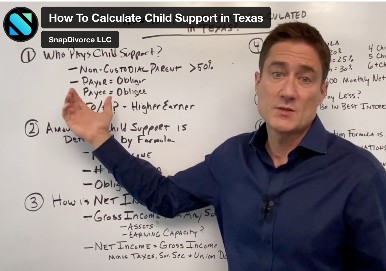
Can I Move Out of the House If I’m Getting Divorced?
Many people going through a divorce wonder if moving out of the house will somehow hurt them legally in their divorce. In this week’s Divorce Academy video, Kevin explains if you can move out of the house without impairing your legal rights, if it is a good idea, and what steps you should take if you are going to move out.
Video Transcription: Can I Move Out Of The House If I’m Getting Divorced?
Hey everyone! Welcome back to Divorce Academy.
Today’s topic is “Can I Move Out of the House if I am Getting Divorced, and, if so, is it a Good Idea?
Today we are going to answer the question “can I move out of the house if I am getting divorced?” Then we are going to go over the pros and cons if you’re going to do so. And finally, we are going to talk about what steps you should take to protect yourself if you are going to move out of the house.
Let’s start with the question, “Can I move out of the house if I am getting divorced?” This comes up because people have heard the term “abandonment” or “desertion.” These are terms from the Fault Divorce law that you don’t need to worry about. They changed the law. It’s easier to get a divorce now. Nobody’s going after a fault divorce. So, it’s not going to hurt you legally. So, the short answer is yes, you can move out of the house without worrying about abandonment and desertion, and there are no direct legal consequences. But . . . there might be some indirect legal consequences. That’s why you have to balance the pros and cons.
Let’s start with the pros.
Reduced conflict and mental health, the most obvious one. It’s very difficult to live with a spouse if you’re going to get divorced. So, if you move out, it’s going to reduce the level of conflict and it’s actually going to help you settle your case.
Number two, you can get support. The courts are not going to give you support if you’re still living together, especially if your spouse is paying the household bills. You’re going to have to move out of the house to either get child support or alimony pendente lite, or both.
Next, protect your stuff. Look, when you’re living with a spouse you’re not getting along with, stuff happens. We had a client who took her wedding album, went outside, threw it on the grill, doused it in lighter fluid, and lit it on fire. Those are the sort of things that happen when you’re getting divorced. So, if you move out, you can take your stuff with you, and you can protect it.
Next, you can see your kids separately. Again, when you’re living together, it’s a tense situation, it’s not comfortable to be hanging out with your kids by yourself, your spouse is there hovering around, maybe they’re micromanaging you. If you get out, then you can continue having a good relationship with your children.
Next, there’s a lower chance of a domestic incident. What do I mean by that? I’m not talking about spousal abuse or anything like that. I’m talking about just the stuff, the crazy stuff that happens when you’re getting divorced. So, we had one client, him and his wife were living in a house together, somehow, they got into a fight over a laptop computer. Next thing you know, they’re in a tug of war. The wife’s hand slipped, she went flying back, and hurt herself. Well, she was mad, so she called the police. Next thing you know, he’s charged with assault. She tries to withdraw the charges. The DA won’t do it. He ends up with like a misdemeanor assault. You don’t want that happening to you.
Finally, you can start to move on. You know, look, once you’re out of the house, you can start looking past the divorce. What’s your future life going to look like? Again, that can help you settle your case, it can help you to be able to negotiate with your spouse.
Overall, there’s a lot of pros to moving out.
Let’s talk about the cons.
You could possibly be liable for support. You know, over here, I say you can get support, well guess what? If you’re the higher earning spouse, or if you don’t have primary custody of the kids, then if you move out, you very well may have to pay your spouse support who’s remaining in the house.
Issues with payment of the mortgages and expenses: If you move out, who’s paying the mortgage? Your spouse is supposed to, if they stay in the house. But guess what? It doesn’t happen a lot. And then what are you going to do? You know, your credit is going to suffer, you’re going to have to take your spouse back to court. Maybe try and sell the house. There’s not a lot of good options.
Problems with custody: Guess what? If you don’t have a custody order in place before you leave, who’s going to watch the kids? When are you going to see the kids? Who knows? That can set up another problem, which is prejudice. Prejudice with custody and prejudice with the house if you want to buy it in the divorce. So, typically what happens is somebody moves out, they don’t have a custody order in place. The spouse who’s staying in the house, you know, the kids are still there, that spouse starts to control and say, you know you can see the kids this weekend. Next thing you know, a couple months later and you’re in court, you’ve only been seeing the kids every other weekend, and the court’s like “Well, you know, what’s wrong with that? Status quo, you know, seems like it’s working.” It’s going to put you in a difficult position for custody if you don’t have a custody order in place before you move out. Same thing with the house. You know, you might want to get out because you don’t want to live with your spouse, but guess what? You might want the house in the divorce. You know, you might be the only one who can afford it or whatever. If you’re out, and your spouse is competing with you for the house, guess what? They’re already going to have an advantage. They’re already living there.
Next, additional costs: So, in addition to possibly having to pay support, you’re going to have to get a new place to live, if you don’t live with your relatives. Rent, another mortgage, more utility bills, you know, et cetera.
Finally, if you move out, it puts your spouse in control of the house. Are they mowing the lawn? Are they keeping it clean? Who are they letting in the house? You know, all kinds of things happen. Down the road, when the divorce is wrapping up, you may have to sell the house. If your spouse is in there, you know, are they going to cooperate with the realtor? Are they going to keep it in “show-ready” condition? You know, it causes a lot of problems.
So, there’s quite a few cons to moving out. So, you know, you’re going to have to analyze your own situation, try and balance the pros and the cons. Typically what happens, people try to “stick it out”, they try to stay in the house, maybe they’ll last 3 months, 6 months, and then they just can’t take it anymore, and they move out.
Finally, if you decide to move out, what steps do you need to take to protect yourself?
First of all, forward the mail. Right? I mean, you’re going to have to get your mail. Typically, when someone comes to us and they’re getting divorced, we’ll recommend set up a post office box right away. But, if you haven’t done that, then you need to think about getting your mail to either a post office box, or to your new address.
Protect your financial information and your property. Before you move out, make copies of everything: tax returns, 401k statements, bank statements. That includes your stuff and your spouse’s stuff. So, you’ve either got to take it with you, or you’ve got to make copies of it. Same thing for property. If there’s things that are important for you, you know, your grandmother’s chest, an important piece of artwork, take it with you! We had a spouse who moved out. He left his wine collection behind. Well, I think you can probably figure out what happened to that wine collection. The wife drank it all. And this was an expensive wine collection.
Utilities and insurance. You know, you’re going to want to think about cancelling things, like you want your name off of the cable bill, or the electric bill. You need to give your spouse warning. Say “Look, in 30 days, I’m cancelling the cable bill.” Same thing for insurance. You’re going to have to change your address for your car insurance et. cetera.
And finally, the big one’s going to be, you know, if you’ve got kids: custody. What are you going to do? And also, you know, how are you going to move out? There are like, the divorces that are fairly amicable, you know, you can say “hey, I’m moving out, let’s try and work these things out.” If you’re not in that category, if you’re planning, like, the move out in the middle of the night, you know, or while your spouse is away on a business trip, or while they’re away at work and you’re going to take the kids with you. Well, guess what? I put a star next to that because you need to see an attorney. In those situations where it’s a really volatile situation, you’re sort of sneaking out of the house, that’s when you got to talk to an attorney. You got to make a plan.
So, that’s pretty much moving out of the house in a nutshell. You can do it, just balance the pros and the cons, and when you’re ready to do it, make sure you plan accordingly.
I hope that this is helpful, and I’ll see you next time on Divorce Academy. Thanks!
Related Articles

Don’t blow
everything for
the sake of
revenge.
Find out how SnapDivorce® can help you simplify your divorce.



